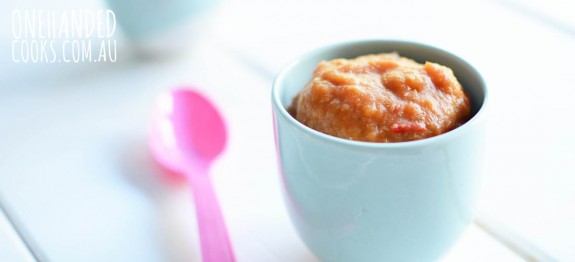Benefits of Homemade
Benefits of Homemade
Whether its for your baby, your toddler or your whole family, shifting back to a more natural way of eating, more home cooking and less buying of commercial foods has benefits that far out weigh the convenience of prepackaged foods. Our modern day lifestyles are extremely busy and many parents are time poor. But limited time does not mean you can’t create nutritious food for your children. Knowing what is going into the food you give your children is always the best option for their health and your peace of mind. We promise you, that with a little organisation and pre-cooking, homemade food is not only healthier but it is surprisingly simple and oh-so-much cheaper than the alternatives.
Check out our Foodie eBooks or bestselling books ‘Raising a healthy, happy eater‘ and ‘Boosting your basics‘ for the best up-to-date advice on feeding children and irresistible recipes to try.
There’s no doubt that commercial baby food and snack foods for our kids makes life easier, simpler and we are fortunate enough to have an abundance of good quality pre-packaged food on offer. But many of these options also have a pinch of the bad; be it filler food, high cooking temperatures, excess salt, artificial flavours, colours and other preservatives. The companies that make this food don’t write that on the front of the packet and who has time to look at the back?
Babies fed predominantly commercial baby foods when they start solids quickly become accustomed to their flavour and smooth texture. So when they are offered foods such as home cooked purees or finger foods they aren’t familiar with they will naturally want to refuse them and request their preferred foods.
While very convenient and very useful a times, commercial baby purees often include a high percentage of fruit (even despite a savoury flavour), a low percentage of meat or other protein containing foods, and they rarely vary in their texture. Whereas homemade baby food will naturally vary in its texture depending on the ingredients you use. The silkiness of a pumpkin puree will always be different from the more fibrous textured vegetable puree that includes peas and broccoli. The benefits of experiencing this right from the start are invaluable to your child’s enjoyment, acceptance and their overall learning about food. Plus there are only so many foods and flavour combinations available commercially, in your kitchen the possibilities are endless. Adapting your family meals, or selecting appropriate ingredients, to create a meal for your baby will help smooth the transition to family food and hopefully avoid many fussy eating behaviours.
BENEFITS OF HOMEMADE BABY FOOD
- You can select the best quality ingredients
- Naturally varies in texture
- Encourages variety with unlimited flavour combinations on offer
- Helps with a smooth transition to family food
- Varied textures encourages oral motor skills and development
- Can reduce fussy eating behaviour
- Economical
TIME & MONEY SAVING TIPS TO COOKING HOMEMADE BABY FOOD
- Meal plan
- Cook in bulk and freeze in small portions
- Mix and match various fruit, vegetable and/or meat combinations from the freezer to make new flavours
- Choose fruits and vegetables that are in season
- Use ingredients you have already in your fridge and pantry
- Adapt family meals to make them suitable for your baby with our one meal three ways
TOP TIPS TO ENCOURAGE ACCEPTANCE OF HOMEMADE BABY FOOD
If your little one can’t get enough of commercial baby purees and can’t stand the sight of your homemade delights please don’t give up and think all is lost. It’s never to late to encourage the transition back to homemade. Here are our top tips to help encourage acceptance of a variety of new flavours and increasing texture:
- Let them get messy with food
- Cook purees based on flavour combinations you know your little one enjoys
- Combine the commercial variety with small amounts of your homemade version, slowly reducing the quantity of prepackaged foods you’re adding to the mix. Before you know it your baby will be accepting your own homemade purees
- Begin to introduce more adventurous flavour combinations and introduce some simple herbs and spices including parsley, basil and garlic
- Next start to blend appropriate family meals to help with transition to family foods
- Finally, increase the texture by processing less of ingredients, simply mashing or the addition of rice, quinoa, couscous or legumes after pureeing the other ingredients
NUTRITION NOTE
Babies and toddlers don’t need salt in their diets. It can be damaging to their health and wellbeing. Thankfully added salt is not allowed as ingredient in packaged food for babies under 12 months, so it’s important you don’t add any salt to their home cooked foods either. Choose fresh meat, fruits and vegetables and if you are using any packaged foods choose products that have a sodium content of less than 75mg per 100g to help keep their salt content low.
Join us on Facebook for other foodie bits and pieces.



























